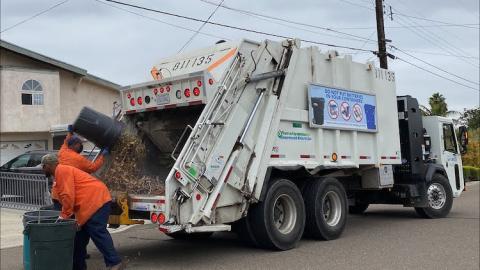By Alberto Garcia
Investigative Reporter
The City of San Diego is holding open meetings for residents to have input on a new plan to charge single-family homes for trash services after voters approved a ballot measure in 2022 to amend the City’s Charter that had provided free garbage services for over 100 years.
The meetings come more than 18 months after City voters approved Measure B on the November 2022 ballot to allow the City the option to charge residents for trash services which have been provided to all single-family homes and small business for free.
Although the Measure B campaign claimed that residents could expect monthly trash bills of $23 to $29 based on a report by the City’s own budget analyst, no specific cost was approved by the ballot measure.
Instead, Measure B outlined a process to study the costs of services provided by the City and develop fees that cannot exceed the total cost of the program, but could allow for variable pricing based on levels of service, as well as provide for low-income or other discount programs.
Proponents of Measure B, including San Diego City Council President Sean Elo-Rivera, argued that allowing single-family homes and small business to receive free trash services when apartments and multi-family apartment and condo complexes pay for their own private trash pick up was regressive and unfair.
“It’s a two-tiered system, and that’s unfair in and of itself,” Elo-Rivera said in 2021 after the City’s Independent Budget Analyst released a study on the issue.
But opponents countered that charging residents for services that have traditionally been provided for free equated to a new tax increase.
The City currently spend over $57 million per year on its trash services, including recycling and landfill costs.
Several County Grand Jurys had studied the issue over the past 20 years and suggested that the City create a program to implement trash services fees.
The People’s Ordinance passed in 1919 added language to the City’s Charter making the City responsible for trash services and created a mechanism for the City Council to impose fees but that part of the ordinance was never implemented, so no fee was ever established.
For over 100 years, the City has provided trash services to single-family homes using City-owned trucks and City employees.
The move to have the City take over trash services in 1919 was a result of the private company charging residents for garbage pick up at the time providing unreliable and expensive services while selling residents’ food waste to hog farmers in Los Angeles for a profit.
San Diego leaders created the People’s Ordinance to take over the trash services directly and to capture the profits of selling the food waste in Los Angeles, thereby benefiting local residents.
By the 1960s, the City stopped selling the food waste in Los Angeles but the responsibility to provide free trash services remained.
Crtitics of Measure B argued that the language was vague and may have confused voters who did not realize they were voting to tax themselves for trash services.
The official ballot language referred to “comparable” services to all City residents and specifically referred to services “at no extra charge” when referring to additional services like “recycling, bulky item pickup, and curbside container replacement and delivery.”
Measure B asked voters:
“Shall the San Diego Municipal Code be amended so that all City residents receive comparable trash, recycling, and other solid waste management services, by allowing the City to recover its cost of providing these services to eligible residential properties, which could allow the City to provide additional services, such as weekly recycling, bulky item pickup, and curbside container replacement and delivery, at no extra charge?”
Voters passed 2022’s Measure B by a narrow margin of only 3,839 votes our of over 400,000 votes cast. The final count was 50.48% win support and 49.52% opposed.
The City Council is expected to approve a final fee structure sometime in mid-2025.
